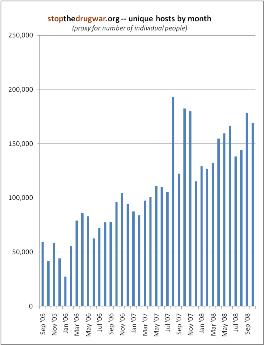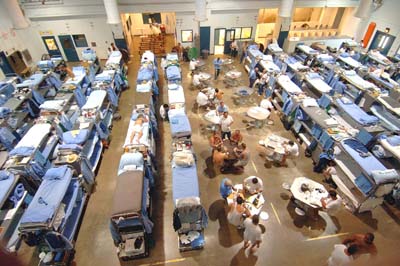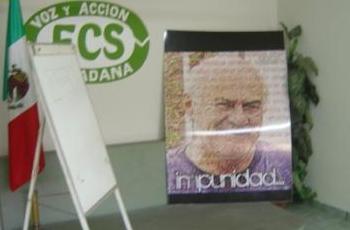Recent reports from Holland have given the impression that the coffee shops are under pressure and could even be shut down. Don't believe it.
The Kanawha, West Virginia, school board wants to randomly drug test teachers. But that's stretching the law, and neither the teachers' unions nor the ACLU are going to let it happen without a fight.
StoptheDrugWar.org (DRCNet) seeks tax deductible donations as year's end approaches for our educational programs -- especially our web site, on which readership continues to go up and up.
StoptheDrugWar.org (DRCNet) is a nonpartisan organization, and no major party nominee for US President has yet supported enough of our mission to change that. Nevertheless, the views expressed in President-Elect Obama's books, speeches and campaign appearances are mostly positive, and enactment of them would make a major difference in drug policy and help many thousands of people. We need your help and your participation to fight this important fight at this time of opportunity.
Sodomizing SOB NYPD cops get indicted, a New York Health Department narc gets in trouble, so does a Michigan State Police narc and a Texas jail guard, and Rod Blagojevich isn't the only thing crooked in Chicago.
Pennsylvania housewife Christine Korbe heard what she thought were robbers breaking into her home at dawn on November 19. She opened fire from a stairway, shooting an FBI agent serving a drug arrest warrant on her husband before calling 911 to report a break-in. Now, in the latest example of overly aggressive drug raids gone bad, the FBI is dead, and Korbe is facing murder charges.
After Atlanta narcs gunned down 92-year-old Kathryn Johnston in a bad drug raid, local officials sought to ease public outrage and concern by creating a Civilian Review Board to investigate abuses. Now the cops are trying to gut it.
Americans can rest secure in the knowledge that our country maintains its role as the world's leading jailer. According to a new Bureau of Justice Statistics report, we have an all-time record 2.3 million people behind bars, and that includes more than half a million drug offenders.
The Montana Meth Project, with its scary graphic images of the consequences of using the drug "just once," has been widely touted as a successful prevention effort. Not so fast, say researchers who have reviewed the results.
The death toll in Mexico's prohibition wars has passed 5,000 this year, making it comparable to the death tolls in the wars in Iraq and Afghanistan.
The German agency that regulates medicine has issued an exclusive license to a Belgian firm to import and distribute medical marijuana to a handful of patients who have won exceptions to the country's drug laws. The bud should be in pharmacies by next month.
People have grown cannabis for centuries in Morocco's Rif Mountains, and Moroccan hash has been a hit in Europe for decades. Now, after five years of trying to suppress the crop, the discussion over possible legalization has hit the public airwaves there.
Help build the movement and inform the public by running a StoptheDrugWar.org banner on your web site.
Events and quotes of note from this week's drug policy events of years past.
"You Can Help Encourage Obama to Answer Questions About Our Marijuana Policy," "DEA Says it Has a Policy of Not Arresting Medical Marijuana Patients," "Southeast Asia Plans to be Drug-Free by 2015," "Don't Consent to Police Searches or Answer Incriminating Questions," "America's Meanest Prosecutor Refuses to Resign," "Elderly People Who Grow Pot in Albania," "Can Both Sides of the Drug War Debate be Completely Wrong?," "The Discovery of 2,700-Year-Old Marijuana is Pretty Cool," "Are Cocaine Users Killing the Rainforest?"
StoptheDrugWar.org (DRCNet) is seeking volunteers in the DC area to help with our membership drive; and from anywhere to help with a writing-based project on which work has already begun.
Apply for an internship at DRCNet for this spring (or summer), and you could spend the semester fighting the good fight!
For more than 30 years under the policy of "gedoogbeleid," which could best be translated as "pragmatic tolerance," the Dutch have allowed the sale of personal amounts of marijuana through the coffee house system, even though doing so is technically illegal. But lately, especially for those of us on this side of the water, a black cloud appears to be hovering over the coffee shops. The number of coffee shops has contracted from about 1,500 in 1995 to 720 now, as successive governments have tightened the screws. The current national government is hostile, if somewhat divided on the issue, and recent headlines about moves to close coffee shops in some border towns and reduce their numbers across the country add to the ominous picture.

Smokey coffee shop (courtesy amsterdam.info)
But the picture is nowhere near as gloomy as presented by the occasional Reuters or Associated Press report covering such developments. Dutch cannabis policy is approaching a tipping point, the status quo is under pressure, but in the medium-term, the end result is more likely to be a move to regulate cultivation as well as retail sales, perhaps under gedoogbeleid policies that leave the laws on the books but ignore them in practice, than the end of the coffee houses and retreat back into prohibition.
Three parties in coalition form the national government: the Social Democrats (PvdA), the Christian Democrats (CDA), and Christian Union (CU), a fundamentalist Christian Party. The two Christian parties oppose drug use in general and the coffee shop system in particular, and would like to see it go away. But the most powerful party in the coalition, the Social Democrats, is much less hostile, and even amenable to regulating cannabis production as well as retail sales.
While the Christian parties appear implacable in their opposition on moral grounds, the PvdA and the opposition parties are arguing more pragmatically over a pair of issues that have come to symbolize the "problems" of the coffee shops. One is the endless influx of cannabis buyers from neighboring countries with more repressive laws, who clog the city centers of border towns and sometimes deal with hard drug dealers and create public nuisances as well. The other major issue around the coffee shops is the "backdoor problem," wherein, while retail sales at the coffee shops are tolerated, the wholesale supply of cannabis to the coffee shops remains tethered to a criminal netherworld.
"It is true that some problems have arisen around the coffee shops," said Joost Sneller, assistant to opposition DP66 Party MP Boris van der Ham, "but a lot of that has to do with vagueness surrounding cultivation, and not with the coffee shops themselves. The backdoor problem is only a problem because we make it so," Sneller argued. "There is one simple solution, and that is legalization of backdoor purchase and the regulation of the entire soft drugs chain. The selling of cannabis should be licensed," he said.
"The coffee shops are a good way to deal with soft drugs and regulate their sales," agreed Velzen van Krista, an opposition Socialist Party MP. "The coffee shop system definitely ensures that people who buy soft drugs don't get mixed up with hard drug sellers."
While the coffee shops are a good interim measure, the best approach would be to simply regulate the whole trade, said van Krista. "Our people don't use soft drugs at a higher rate than surrounding countries, and since it is being used anyway and making it illegal doesn't help, we might as well just legalize it," she argued. "That would create legal jobs, taxable income, quality control, even jobs in security work, because there is a lot of dough in growing."
Marc Josemans, a coffee shop proprietor since 1983, is president of the Maastricht coffee shop association, representing all 14 coffee shops in the border city. The Maastricht association is one of eight regional associations, all of which are organized into the national coffee shops association, LOC, which represents about a third of all coffee shops in the Netherlands.
"The best solution for the problem of foreign cannabis consumers who visit our city just for the coffee shops, 43% of all visitors, is that their governments take responsibility by creating a safe place where people can buy their products without coming into contact with the hard drugs," said Josemans. "In the meantime, we will relocate some coffee shops to the outskirts of town especially for those foreign coffee shop visitors."
Van Krista also suggested moving border town coffee shops to non-tourist areas. "The people coming to the coffee shops aren't coming to look at our beautiful cities but to go to the coffee shops," she said, "so I think we should locate them in the outskirts or in industrial zones."
As for the backdoor problem: "We need one transparent line of production, consumption, and sale of cannabis," said Josemans. "That's the only solution. By regulating our back door, we can benefit from quality controls on cultivators and tax revenues like the coffee shops. We cannot imagine that the soft drugs policy that has been proven to work will be thrown overboard because some politically in-charge moralists believe in a 'drug-free' world," Josemans said.
But while there is much talk within the national government about the "coffee shop problem," by the terms of the accord they reached when they took power in 2007, the coalition parties are bound not to attempt to alter the status quo on the coffee shops during their term in office, which ends in 2010. The accord was an attempt to gloss over ideological differences between the parties, and the result was that the only official national government position is a desire to close down coffee shops within 250 meters of secondary schools. But the only officials who can act to close coffee shops are municipal authorities, and they are much less hostile than elements of the governing coalition.
"The government thus put the responsibility for the administration of cannabis policies for the next few years at the local level," noted Joep Oomen of the European Coalition for Just and Effective Drug Policies (ENCOD), who observes Dutch developments from nearby Antwerp, Belgium.
It is at that level, where officials have day-to-day experience dealing with coffee shops and the issues around them, that support for complete legalization is growing -- and it is growing in an effort to find pragmatic solutions to the real problems around Holland's half-baked cannabis policies. The ball really got rolling last month, when the mayors of the southern border towns of Roosendaal and Bergen op Zoom announced they would close all the shops in their cities because of the influx of foreigners. That led the mayor of Eindhoven to announce a proposal for a municipal cannabis garden to supply coffee shops in his city in a bid to reduce the illicit cannabis trade that exists outside the coffee shop system and causes many of the problems associated with foreign "drug tourism."
Those moves in turn led to the November 13 "Weed Summit," where the 30 most involved mayors called for a "simple and transparent policy, including a legal system to supply the coffee shops that would be carried out in coordination with European governments." This proposal was also signed by the mayors of Roosendaal and Bergen op Zoom, whose announcement of looming coffee house closures now appears more an effort to goad policy-makers than a genuine intent to shut them down.
"Please note the difference here between announcing the shut down and actually closing them down," said ENCOD's Oomen. "Roosendaal and Bergen op Zoom just announced that they will close down all coffee shops, but we have to see how that takes place in practice. Dutch administrative requirements are famous for being heavily bureaucratized, so the owners have the possibility to slow down this process," he noted.
The situation in Amsterdam, which garnered international press service reports when Mayor Cohen announced he would close 20% of the city's coffee shops because they are within the 250-meter school zone, is similar, said Oomen. "The mayor has said he will not effectively start closing until two years from now, not coincidentally the year in which new elections will take place. Some people see in the announcements of the mayors a way to force national politicians to take a clear decision on this and not leave the responsibility on them."
"Cohen threatened to close down well known coffee shops just to make the discussion more clear," agreed van Krista. "This has really helped clarify the discussion."
The mayors were also responding to recent rumblings from the governing coalition about shutting down the coffee shops altogether. On November 8, CDA leader Pieter van Geel announced he favored closing down the coffee shops, prompting a quick rejection of that idea by his coalition partners the PvdA, and spurring the mayors to act.
"That seems to be the case," said Sneller. "Remember that the mayors are fueling the debate this year. We don't think the mayors are responding with a sort of anti-restriction Pavlovian response, but that they really believe regulation is the best course."
Perhaps, said Oomen, all of the scary noises from the Christians are a good thing. "The pressure from the right provokes the discussion, and in this discussion, people almost automatically reach the conclusion that a regulation is a much better option than total prohibition. It is becoming more likely that a future Dutch government without the Christian Democrats and without too heavy US or UN pressure will take important steps towards regulation."
Last week, ENCOD, the Cannabis College, and the Dutch Drug Policy Foundation tried to stoke the embers of reform with a Cannabis Tribunal at the Hague. The tribunal challenged Dutch parties to disprove the proposition that "Cannabis prohibition has more negative effects than positive ones." The only politician who took up the challenge was Cisca Joldersma, spokesperson for the CDA on drug issues, who faced off against Hans van Duijn, former head of the Dutch Police Association and a supporter of legalization. Joldersmas' arguments, based solely on opinion without resort to evidence, were deemed "without merit" by the judge of the tribunal, law professor Hendreik Kaptain of Leiden University. The organizers concluded that a parliamentary debate on cannabis prohibition is urgently needed, as no Dutch political party can explain why it should be maintained.
And so it goes in Holland. Despite the bluster of some of its members, the governing coalition is not going to touch cannabis policy. That leaves the initiative in the hands of the mayors and other interested parties -- at least until 2010, when the Dutch will have the chance to replace an at best cannabis-neutral government with a cannabis friendly one. Then, perhaps, that famous Dutch gedoogbeleid can expand to encompass the entire cannabis complex.
back to top
After several months of discussion, the Kanawha County (Charleston), West Virginia, school board voted 4-1 in October to go ahead with a plan to randomly drug test teachers and other school district employees. The new policy expands an existing policy that provides for drug testing of teachers upon suspicion of drug use. The move came despite repeated warnings that it would result in a long and costly legal battle with teachers and civil libertarians.

drug testing lab
The policy of randomly testing teachers and other employees without cause is at the spear tip of the expansion of drug testing. While random drug testing of students involved in athletics or extracurricular activities has been approved by the US Supreme Court, the random testing of teachers and other district employees breaks new ground. A similar battle is underway in Hawaii, where Gov. Linda Lingle is attempting to impose drug testing as part of a new teachers' contract, and a Louisiana state legislator is attempting to do the same thing there. But beyond those instances, data is scarce.
"It's hard to get firm data on this," said Lisa Soronen of the National School Board Association. "We don't have much more than anecdotal information, but my sense is that teacher drug testing is an issue that is more often considered than followed through on because cost, constitutional challenges, and political pressure not to do it make in undesirable for many school boards."
The association takes no position on teacher drug testing, said Soronen. "We have not taken specific positions on either student or teacher drug testing," she explained. "Our mantra is one of local control. Our view is not that school districts should do this, but that they should make the decisions themselves. If they want to do it, they should be able to."
Although both West Virginia courts and the US Supreme Court have held that government workers cannot be forced to participate in suspicionless random drug testing programs unless they are working in "safety sensitive" positions, the Kanawha school board is hoping to get around those rulings by defining virtually all school jobs as "safety sensitive."
"I guess there's nothing more safety sensitive than someone who has my child all day long," school board president and mother Becky Jordon told the Charleston Daily Mail late last month.
In local press articles, all four board members who voted for random drug testing cited community pressure, despite little evidence of drug use among district employees. That pressure was in part the result of three highly publicized but statistically insignificant incidents involving drugs and school employees in recent years. In one case, an elementary school teacher was arrested for cocaine possession, but was later acquitted and returned to work. In another case, there are allegations that a librarian had a relationship with two male students that included drug use. In a third case, an elementary school teacher was arrested after police found methamphetamine making materials in his home.
But some board members also suggested they hoped they could set legal precedent in expanding the scope of drug testing. "As a board member elected by the public, with the constituents I could not find any reason why I should not at least respond to the will of the people to pursue something I was not totally convinced had been eliminated as totally unconstitutional," board member Bill Raglin told the Daily Mail. "I'm not going to go against the ruling of the courts, but I want to hear what the courts have to say," he said. "And I'm not willing to accept what I am told by the ACLU lawyer or anyone else because it's an opinion they have -- it's not a court ruling."
Now, the warnings of legal challenges have come true. On November 26, the American Federation of Teachers (AFT) West Virginia affiliate filed suit in Kanawha County District Court seeking to block the program from being implemented. Last week, the West Virginia Education Association (WVEA) and the American Civil Liberties Union (ACLU) joined the fray, filing a second district court lawsuit seeking to block the program before it goes into effect on January 1.
"The Board left us no choice but to file the suit once they decided to implement a policy that risks student safety and violates the constitutional rights of its employees," said AFT-Kanawha chapter head Fred Albert. "The policy violates the constitutionally protected privacy rights of those school employees who will be randomly screened and who are not engaged in safety sensitive positions. The policy, in effect, places all teachers under suspicion; and this is both morally and legally wrong."
"The proposed random drug testing of public school employees is an affront to our fundamental rights and a senseless waste of scarce taxpayer dollars that will not increase student safety," said Adam Wolf, an attorney with the American Civil Liberties Union. "Public servants should not be required to surrender their constitutional rights as a condition of serving their community."
The AFT-Kanawha's Albert told the Chronicle Wednesday that while the issue of employee drug use probably drove the board to its decision, there was really very little of substance to it. "We had a case three years ago of an administrator who was caught with a substance, but he was cleared in a court of law and reinstated," Albert said. "There have been two other cases, but neither one was people showing up impaired by drugs. I think this was the primary factor in the board's decision."
Albert was quick to point out that while his organization is fighting the new policy, that doesn't mean it supports dope-snorting teachers. "My union does not and has never advocated for teachers or any other school employee using drugs or being impaired and putting children in harm's way," he said. "There is a policy in place, approved by the board about a year ago, that anyone who appeared to be impaired on the job should be tested on suspicion. We don't have any problem with that. But we don't feel that the rest of us who don't use illegal drugs should be considered guilty and have to prove our innocence."
Now it will be up to the courts to decide. And the Kanawha School Board is preparing to spend hundreds of thousands of scarce education dollars to find out. Albert and the teachers think that money, and the estimated $40,000 a year to implement the random drug testing program, could be better spent actually educating students.
back to top
Early last month we wrote seeking support for StoptheDrugWar.org (DRCNet)'s lobbying programs, to help us lobby the Obama administration and Congress on causes near and dear to the hearts of drug reformers with which the President-Elect has said he agrees.
We are also seeking tax deductible donations to our educational programs, especially our web site, on which readership continues to go up and up.
 StoptheDrugWar.org web site traffic has grown at 60% per year for the past two years, as the chart to the left shows, bringing our average number of visitors to more than 150,000 per month. Over two hundred thousand people are verified to have read election-related drug policy coverage on our web site since the primaries began in earnest last year, and that doesn't include the most numerous number of our readers, those who read the content on our daily blog on our home page.
StoptheDrugWar.org web site traffic has grown at 60% per year for the past two years, as the chart to the left shows, bringing our average number of visitors to more than 150,000 per month. Over two hundred thousand people are verified to have read election-related drug policy coverage on our web site since the primaries began in earnest last year, and that doesn't include the most numerous number of our readers, those who read the content on our daily blog on our home page.
|
notepad folder:

one book we offer:
 |
As our thanks for your support, we continue to offer a wide range of books, videos and StoptheDrugWar.org gift items to members donating over certain levels --
visit our donation page to read the full list. Also, everyone donating this week will receive a complimentary StoptheDrugWar.org "Truth Campaign" notepad folder, and all donors will receive a StoptheDrugWar.org bumper sticker and a square StoptheDrugWar.org stop sign sticker, both being reprinted this month.
Drug policy reform is such an important issue, but it's an important issue that needs your help. We at StoptheDrugWar.org need you to ensure that this time of change, will bring needed change, for a disadvantaged, demonized and under-represented group in our society, the targets of the brutal War on Drugs. Please donate today, and together we will make things happen.
Thank you very much for working to change this country's drug policies and for continuing to be part of StoptheDrugWar.org. And thank you for giving your support to our efforts at this important hour. Your contribution has never been more important.

David Borden
Executive Director, StoptheDrugWar.org (DRCNet)
News & Activism Promoting Sensible Reform
P.S. Every day that goes by, 4,000 people are arrested for drug offenses, the vast majority of them minor, and half a million nonviolent drug offenders languish yet another day in the staggering number of prisons and jails the government has very unwisely built. It's time to stop this senseless tragedy and shocking injustice. Please increase your commitment to ending the drug war by donating to StoptheDrugWar.org today. Thank you!
back to top
Dear drug law reformer:
New times bring new opportunities.
StoptheDrugWar.org (DRCNet) is a nonpartisan organization, and no major US party presidential nominee has supported enough of our mission to date for this to change. That said, the views on drug policy and criminal justice expressed by President-Elect Obama in his books, speeches, and campaign appearances add up to a platform that is mostly positive, and which if enacted would make a major difference in our issue helping many thousands of people.
These include causes near and dear to the hearts of drug reformers: Stopping the raids on medical marijuana clinics; Repealing unjust mandatory minimum sentences, including the infamous crack cocaine penalties; Decriminalizing marijuana (sort of); Ending racial profiling; Lifting the federal needle exchange funding ban; Eliminating barriers to integration faced by ex-offenders, to name several.
Changes like these can happen if, but only if, people like you and I take action to work for change. Please make a generous donation to support StoptheDrugWar.org's lobbying programs, and please stay tuned for the crucial action alerts we will be sending you over the coming months. Your non-deductible donations will help us hire lobbying staff and purchase tools to be able to efficiently communicate with Congressional staffers.
 If you need or strongly prefer to make a tax-deductible donation, or if doing so will enable you to donate much more generously, select "tax-deductible donation" on our donation form to support our educational work. StoptheDrugWar.org web site traffic has grown at 60% per year for the past two years, as the chart to the left shows, bringing our average number of visitors to more than 150,000 per month. Nearly two hundred thousand people are verified to have read election-related drug policy coverage on our web site since the primaries began in earnest last year, and that doesn't include the most numerous number of our readers, those who read the content on our daily blog on our home page.
If you need or strongly prefer to make a tax-deductible donation, or if doing so will enable you to donate much more generously, select "tax-deductible donation" on our donation form to support our educational work. StoptheDrugWar.org web site traffic has grown at 60% per year for the past two years, as the chart to the left shows, bringing our average number of visitors to more than 150,000 per month. Nearly two hundred thousand people are verified to have read election-related drug policy coverage on our web site since the primaries began in earnest last year, and that doesn't include the most numerous number of our readers, those who read the content on our daily blog on our home page.
We continue to offer a wide range of books, videos and StoptheDrugWar.org gift items to members donating over certain levels --
visit our donation page to read the full list. Also, everyone donating this week will receive a complimentary StoptheDrugWar.org "Truth Campaign" notepad folder, and all donors will receive a StoptheDrugWar.org bumper sticker and a square StoptheDrugWar.org stop sign sticker, both being reprinted this month.
Drug policy reform is such an important issue, but it's an important issue that needs your help. We at StoptheDrugWar.org need you to ensure that this time of change, will bring needed change, for a disadvantaged, demonized and under-represented group in our society, the targets of the brutal War on Drugs. Please donate today, and together we will make things happen.
Thank you very much for working to change this country’s drug policies and for continuing to be part of StoptheDrugWar.org. And thank you for giving your support to our efforts at this important hour. Your contribution has never been more important.

David Borden
Executive Director, StoptheDrugWar.org (DRCNet)
News & Activism Promoting Sensible Reform
P.S. Every day that goes by, 4,000 people are arrested for drug offenses, the vast majority of them minor, and half a million nonviolent drug offenders languish yet another day in the staggering number of prisons and jails the government has very unwisely built. It's time to stop this senseless tragedy and shocking injustice. Please increase your commitment to ending the drug war by donating to StoptheDrugWar.org today. Thank you!
back to top
Sodomizing SOB NYPD cops get indicted, a New York Health Department narc gets in trouble, so does a Michigan State Police narc and a Texas jail guard, and Rod Blagojevich isn't the only thing crooked in Chicago. Let's get to it:
In New York City, three NYPD officers surrendered Tuesday to face felony charges for allegedly sodomizing with a police radio antenna a man they suspected of marijuana possession. Officer Richard Kern is charged with aggravated sexual abuse and assault, while Officers Alex Cruz and Andrew Morales have been charged with hindering prosecution and official misconduct. All three were also charged with misdemeanors related to falsifying records. They were indicted last week by a Brooklyn grand jury investigating charges by tattoo shop employee Michael Mineo that when he fled into a subway station after the trio accused him of smoking pot, they tackled and handcuffed him, pulled down his pants, and sodomized him. Mineo was ticketed for disorderly conduct and upon release, and was hospitalized for several days for what hospital discharge papers diagnosed as "anal assault."
In New York City, a state Health Department supervising narcotics investigator was accused in a report by the state inspector general of being a "rogue" officer. According to the inspector general's report, Louis Crisafi, 49, had a yen for fentanyl lollipops, once fired his weapon accidentally while taking a prisoner to jail and never reported it, had lied about his credentials and employment history, staged amateurish and dangerous sting operations, interrogated suspects despite their protests they wanted lawyers, and conducted private self-defense counseling on state time. Crisafi came to the attention of investigators when the New York Times published a photo of his illegally parked yellow Corvette in a story about the abuse of government-issued parking permits. The report concluded: "Ths employee is clearly unfit for a law enforcement position, having shamelessly broken the laws and rules he was hired and pledged to uphold." Crisafi is currently on sick leave, but faces disciplinary action and possible criminal charges for violating suspects' rights.
In Monroe, Michigan, a Michigan State Patrol narcotics officer was placed on paid leave December 4 after police searched his home. Lt. Luke Davis was a member of the multi-jurisdictional Monroe narcotics investigation office. It is unclear what, if anything, they found, but the State Police said they were investigating "an allegation of potential misconduct." Davis was quick to trumpet his non-involvement with possessing, using, or trafficking illegal drugs, although he has yet to be accused of that. The results of the search and attendant investigation will be sent to the state Attorney General's office.
In Brownsville, Texas, a former Cameron County Sheriff's Department jail guard was arrested December 3 for allegedly smuggling drugs into county jails. Gabel Jacques Gonzales is charged with Class B misdemeanor possession of marijuana and felony third degree attempted introduction of a prohibited substance into a correctional facility. Gonzales went down after conspiring with two people to obtain an unspecified amount of marijuana to smuggle into county jails. Unfortunately for him, his partners turned out to be a confidential informant and a DEA agent.
In Chicago, a former Chicago police officer was convicted December 3 of conspiracy for stealing thousands of dollars from drug dealers. Mahmoud Shamah and his partner, Richard Doroniuk, were also accused of stealing $30,000 from a police evidence locker in 2006. Doroniuk testified that he and Shamah routinely carried crack cocaine to plant on suspects, paid informants for bad information, and even bribed a judge to approve an arrest warrant.
back to top
An Ohio woman who shot and killed an FBI agent during a pre-dawn no-knock drug raid at her family home in Indiana Township, Pennsylvania, on November 19 now faces federal homicide and weapons charges. When police serving an arrest warrant for her husband broke into Christine Korbe's home at 6:00am, she fired one shot from a .38 caliber pistol from the top of a second-floor stair case, striking and killing Special Agent Sam Hicks. She was arrested moments later as she called 911 to report a home invasion.

Will they never learn?
The resort to home invasion-style drug raids by law enforcement has resulted in dozens of deaths of suspects or others present in recent years. Police officers involved in killings in those drug raids typically walk free. But when homeowners targeted -- rightly or wrongly -- in no-knock drug raids kill police claiming they thought they were criminal intruders, they don't typically walk free.
In one notorious case, that of Corey Maye, a Louisiana man whose home was mistakenly hit in a drug raid is now serving a life sentence for murder for shooting and killing an intruding officer. In another, as yet unresolved case, Virginia resident Ryan Frederick faces murder charges in the death of an intruding officer in a raid that now appears to have been without any legitimate basis.
Robert Korbe was to be arrested as part of a round-up of drug suspects in the Pittsburgh area. He was one of 35 people charged in a 27-count indictment charging them with conspiring to traffic in powder and crack cocaine from October 2007 through September 2008. He was arrested in the basement of the family home, which he shared with his wife and two young daughters, as he allegedly sought to destroy evidence.
Christina Korbe made her first federal court appearance Monday before Magistrate Judge Robert Mitchell, where she was arraigned on second-degree murder and several firearms charges. A bail hearing is set for next Monday.
"She's totally distraught," defense attorney John Elash told the Associated Press. "All she cares about and all she mentions is she wants to be home with her children. Can't imagine that she won't be home for Christmas."
Elash said that while his client is "extremely remorseful," she will argue that she acted in what she thought was self-defense. "I don't believe my client's guilty of any crime. I think the evidence will show that," Elash said. "It's obviously a self-defense or a defense of others, and the others that she's defending are a 5- and 10-year old that were with her when she was on 911, making the call to the police that somebody had broken into her house."
Law enforcement affidavits filed with the court claim that FBI agents shouted "police" and warned they were serving a warrant before breaking down the door to the Korbe's home as the family slept. According to those affidavits, Robert Korbe said he heard the agents and knew a raid was happening.
"Was this, something, everybody's yelling at one time, so that nobody could understand what's being said?" Elash said. "Could it have been heard by somebody that was asleep or just woken in an upstairs bedroom in a large home? If, in fact, she did hear it was a police officer or an FBI agent, why would she fire one shot at one of them and not continue to fire?" he asked.
"She thought she was being attacked, thought that she had to defend her children," Elash said. "That is what was going through her mind. Only pulled that trigger for one reason, because she thought she was going to get killed or that her children were going to get killed or seriously injured."
Elash isn't alone in sticking up for his client. Neighborhood residents have begun circulating a petition asserting her innocence and holding a collection for the family's children.
"I honestly believe that she couldn't possibly have known that it was a cop," friend Angie McCarrison said. "I think she heard glass break, and she thought, 'Oh my God, my kids,' and that was the end of that."
However Christina Korbe's case ends up, FBI Agent Hicks is dead, a victim as much of overly aggressive law enforcement practices as the bullet that ended his life.
back to top
Faced with public outrage and revulsion in the wake of the November 2006 killing of Kathryn Johnston, 92, in a drug raid that turned out to have no basis, Atlanta city officials created a Citizen Review Board to try to rein in law enforcement abuses. But now, just as the Review Board is getting up and running, the Atlanta Police Department and the city's Law Department are seeking to significantly weaken its ability to investigate police misconduct.

How soon they forget...
On Tuesday, the APD and the Law Department introduced legislation to amend city law regarding how the board investigates complaints about police. The city law establishing the board gives it "full access" to police reports and documents. But now, police are asking that the law be amended to allow them to turn over only documents and other information that are public record. Public records documents are typically minimal while a police investigation is ongoing.
If the move is approved, it would allow police to withhold most information from the Civilian Review Board until any internal police investigations have been completed. But if Tuesday's city Public Safety Committee meeting, where the changes were broached, is any indication, the cops may have a fight on their hands.
While APD Major Lane Hagin, who heads internal affairs and led the effort to weaken the board, was present, he did not speak during the meeting. The opposition to the changes was not so reticent. State Sen. Vincent Fort (D-Atlanta) and Rod Edmond, the secretary for the board, both denounced the proposed changes.
"In effect, it would defang the Citizen Review Board and make it nothing more than a paper tiger," Fort said in remarks reported by the Atlanta Journal Constitution.
Edmond described the proposed changes as "ridiculous" and "insulting." If the amendment passes, he said, the board would be like sports events referees trying to do their job wearing blindfolds.
While Major Hagin did not address the meeting, he told the Journal-Constitution he feared the Civilian Review Board did not have the experience or resources to conduct investigations. He worried that the review board would "rush to judgment" without all the facts, he said. "For us, I think it's better if we do our investigation in a reasonable period of time and then turn it over to them," he said. "At the end of the day, I think the board is going to be impressed with the kind of work the internal affairs unit does."
While the four city council members present at the committee meeting did not offer opinions on the proposal, one of them said he had heard frustrated board members were considering resigning. He urged them not to. "Just tell them to, please, stay in place," Martin told Edmond. "I want them to have faith in the process."
It will be up to the city council to see if the process deserves such faith.
back to top
The number of people in jail or prison in the United States hit another record at the end of last year, according to a report from the US Department of Justice's Bureau of Justice Statistics released Thursday. According to the report, Prisoners in 2007, 2,293,157 people were behind bars at the end of last year, roughly two-thirds of them serving prison sentences and one-third doing jail time.

overcrowding at Mule Creek State Prison (from cdcr.ca.gov)
Drug offenders made up 19.5% of all people doing time in the states, or roughly 400,000 people. In the federal system, drug offenders account for well over half of the 200,000 prisoners (those numbers are not included in this report), bringing the total number of people sacrificed at the altar of the drug war to more than half a million.
Parole and probation violators accounted for about one-third of all new prison admissions last year. It is unclear how many violations were for drug-related reasons, but that number is undoubtedly substantial.
The imprisoned population continued to grow last year, albeit at a marginally slower rate than the decade as a whole. The number of those imprisoned grew by 1.8% last year, down from 2.8% in 2006, and slightly lower than 2.0% a year average since 2000.
The population behind bars continued to grow at a faster rate than the population as a whole last year. The number of people imprisoned per 100,000 population -- the imprisonment rate -- rose from 501 in 2006 to 506 last year. It was 475 per 100,000 in 2000. Since 2000, the number of people behind bars increased by 15%, while the US population increased by only 6.4%.
The prison populations in 36 states and the District of Columbia increased during 2007. The federal prison population experienced the largest absolute increase of 6,572 prisoners, followed by Florida (up 5,250 prisoners), Kentucky (up 2,457 prisoners) and Arizona (up 1,945 prisoners), resulting in 58.7% of the change in the overall prison population. Kentucky (12.3%), Mississippi (6.5%), Florida (5.6%), West Virginia (5.6%), and Arizona (5.4%) reported the largest percentage increases in their prison populations.
The prison populations in the remaining 14 states decreased. Michigan's (1,344) and California's (1,230) prison populations experienced the greatest absolute decrease, while Vermont (down 3.2%), Montana (down 2.8%), Michigan (down 2.6%), and New Mexico (down 2.6%) prison populations had the largest percent decreases.
America's position as the world's leading jailer, in both absolute and per capita terms, remains unchallenged, and the war on drugs is playing a significant role. Interestingly, the BJS report comes one day after a study from the Center on Budget and Policy Priorities reported that 43 states face budget shortfalls next year. As for the federal budget deficit, well, who can even keep up with that?
back to top
The Montana Meth Project, an anti-methamphetamine campaign based around scary images of the perils of meth use, has been widely touted as a successful public health intervention. Its images showing the extreme consequences of using the popular stimulant "just once" have been touted by supporters as highly effective at deterring teen meth use, and it has even garnered state and federal funding and been adopted by other states based on those claims.

methamphetamine crystals
Not so fast, said the authors of a new study released this week. In
Drugs, Money, and Graphic Ads: A Critical Review of the Montana Meth Project, published this month in the journal Prevention Science, researchers found that the ad campaign produced a number of negative consequences and challenged its impact on meth use rates in the state.
According to the study, teens who had been exposed to six months of the project's graphic ads were three times as likely to say they did not believe meth use was a risky behavior and four times more likely to strongly approve of regular meth use. Half of the teens said the ads exaggerated the dangers of meth use.
The Montana Meth Campaign and its proponents overlooked such unflattering results when presenting findings to the media and policymakers, the researchers said. Instead, the campaign portrayed its results in the most positive light possible.
The researchers also scoffed at claims the program had reduced meth use. "Meth use had been declining for at least six years before the ad campaign commenced, which suggests that factors other than the graphic ads cause reductions in meth use. Another issue is that the launch of the ad campaign coincided with restrictions on the sale of cold and flu medicines commonly used in the production of meth. This means that drug use could be declining due to decreased production of meth, rather than being the result of the ad campaign," said review author David Erceg-Hurn in a Society for Prevention Research news release Thursday.
Ereceg-Hurn also attacked the theoretical underpinnings of the campaign. "The idea behind the ad campaign is that teenagers take meth because they believe it is socially acceptable, and not risky, and the ads are meant to alter these perceptions," he said. "However, this theory is flawed because the Meth Project's own data shows that 98% of teenagers strongly disapproved of meth use and 97% thought using meth was risky before the campaign started," Erceg-Hurn said.
Spending government funds on Meth Project-style campaigns is a waste of money, Erceg-Hurn concluded. Or, in more diplomatic terms: "Based on current evidence, continued public funding and rollout of Montana-style anti-methamphetamine graphic ad campaign programs is inadvisable."
back to top
The number of people killed in prohibition-related violence in Mexico this year has surpassed 5,000, more than double the number of people killed last year, Mexican Attorney General Eduardo Medina Mora said Monday. The number is likely to grow even higher, he warned.

poster of assassinated Mexican human rights advocate Ricardo Murillo (photo by Chronicle editor Phil Smith)
Violence among drug trafficking organizations and between them and government forces has escalated dramatically since President Felipe Calderón unleashed an offensive against the narcos nearly two years ago. Calderón has sent as many as 40,000 Mexican army troops into the fray, where they've joined tens of thousands of federal, state, and local police fighting against -- and sometimes for -- the traffickers. And the trafficking groups themselves are engaged in a lethal and spectacularly gruesome internecine struggle to control the lucrative multi-billion dollar trade in drugs destined for the insatiable American market.
The death is comparable to that in war zones like Iraq and Afghanistan. According to the independent monitoring group Iraq Body Count, some 8,000 people have been killed in simmering violence in Iraq this year. In Afghanistan, some 4,000 people have been killed in fighting this year. In Afghanistan, 273 US and NATO troops have been killed this year, according to the independent monitoring organization Icasulaties.org. That is little more than half the number of Mexican police and soldiers killed this year.
Medina Mora put the death toll through the end of November at 5,376, a whopping 117% increase over the 2,477 killed in 2007. Most of the killing took place in the border states of Baja California and Chihuahua, and Sinaloa, the home base of the Sinaloa Cartel, although the violence has spread throughout the country, extending even to the Mexico City door steps of high police commanders, another one of whom was gunned down this week.
"These criminal organizations don't have limits," said Medina-Mora. "They certainly have an enormous power of intimidation."
And the killing continues. At least 18 people were killed in prohibition-related violence in southern Mexico on Sunday, including two people whose heads were left outside the mansion of the governor of Guerrero in Chilpancingo. Ten narcos and one soldier died in a shoot-out the same day in Arcelia, Guerrero.
Four more bodies showed up Tuesday in Tijuana, across the border from San Diego, just days after the city saw 36 people killed in a 48-hour period. Meanwhile, 17 people, including a senior police investigator, were killed just days earlier in Ciudad Juárez, across the Rio Grande River from El Paso.
As a result of the escalation of violence in Tijuana, police chief Alberto Capella Ibarra was fired. Last month, Capella Ibarra told the British newspaper The Observer: "This war will continue so long as drugs are illegal and command high prices in the United States. Legalize the drugs, then the Americans can get high and we can live in peace."
But the Americans would prefer instead to pour fuel on the flames. Last week, the US released $200 million in anti-drug assistance to the Mexican police and military, the first tranche in a $1.4 billion, three-year package designed to help the Mexicans crack down on the narcos.
back to top
Beginning this week, a handful of patients in Germany have approval to start receiving medical marijuana from a Belgian firm that produces it for the Dutch government's medical marijuana program. Belgian medical wholesaler Arsus NV, whose subsidiary Fagron Netherlands supplies medical marijuana in Holland, announced in a Monday press release that its Fagron Germany subsidiary has been granted an exclusive license to import and distribute medical marijuana in Germany.

Germany's Federal Institute for Drugs and Medical Devices, Bonn (courtesy Wikipedia)
Medical marijuana is not recognized by Germany's Federal Institute for Drugs and Medical Devices (Bundesinstitut für Arzneimittel und Medizinprodukte - BfArM), but the regulatory agency has allowed four patients to use marijuana since August 2007. Those exceptions came at the urging of doctors and only after it was established that no other treatments were effective.
Germany is now inching closer to full membership in the medical marijuana club, which is currently limited to a small number of countries, including Canada, Holland, and Israel. The US has its own federal medical marijuana program, but since access to it was cut off more than two decades ago, it will go extinct as soon as the last remaining patients receiving marijuana under it do.
On the other hand, the US is also home to the largest population on the planet living in jurisdictions where states have legalized medical marijuana. Roughly one-quarter of the US population lives in medical marijuana states. But they remain vulnerable to federal interference.
back to top
Since at least the 15th Century, farmers in Morocco's Rif Mountains have been growing marijuana, which they typically process into hashish. For decades, Moroccan hash has been a mainstay of European marijuana markets. In recent years, production reached a peak of 135,000 hectares in 2003 before declining to about 60,000 hectares this year and last in the face of aggressive government efforts to eradicate crops and break up trafficking organizations.

Moroccan hashish field
But while the half-decade of harsh repression has led to ever-larger seizure numbers, it has also led to ever-larger arrest figures and stoked resentment in traditional marijuana growing regions. Efforts to reduce cultivation through alternative development programs have proven only partial successful, and now the debate over what to do about marijuana production has broken out into the public sphere.
On Wednesday, December 3, Moroccan Television's second station, 2M, broadcast a live debate on possible approaches to cannabis cultivation called "Cannabis and Hashish: What Approach To Take?" Participating in the discussion were Khalid Zerouali, executive director of migration and customs; Chakib Al Khayari, president of the Association for Human Rights in the Rif region, Professor Mohamed Hmamouchi, director of the National Institute of Medicinal Plants; Hamid El Farouki, director of development at the Agency for Promotion and Development of the Northern Region; and researcher Abderrahman Merzouki.
According to a report on the debate made available by the European Coalition for Just and Effective Drug Policies (ENCOD), the panelists discussed three questions:
- To what degree have alternative development projects been able to support the populations in replacing their illicit traditions?
- Is it possible to direct the cultivation of cannabis towards therapeutic and industrial uses and, in a general way, towards an alternative economy in these regions?
- What is the role of regional and international cooperation in this domain?
While government ministers Zerouli and El Farouki called eradication programs a success, citing a 55% reduction in cultivation since 2003, human rights advocate Al Khayari characterized that figure as "not realistic." He said new marijuana fields that had not been counted had sprung up in various regions. Merzouki supported this opinion, and denounced human rights violations against farmers whose fields were eradicated. The law enforcement approach should immediately be replaced by a social approach, he said.
Al Khayari added that alternative development projects tried for the past quarter-century have had some successes, but have not managed to blunt marijuana production. Part of the problem, he said, is that such products are limited. Another part of the problem was that the project designers and managers have not taken into consideration the economic problems and cultural traditions of marijuana cultivation areas.
According to Al Khayari, cannabis cultivation in the Rif predates the arrival of the Arabs. Even the porters of the Koran pray to Allah to protect their sacred plant, he noted.
Professor Hmamouchi insisted that lack of basic infrastructure in some producing regions, a result of the traditional marginalization of the Rif, were a fundamental impediment to alternative development programs. Hmamouchi proposed a larger investment in the National Initiative for Human Development to develop new projects that could help the producing regions.
As the debate wound down, human rights advocate Al Khayari proposed legalizing marijuana as the only practical solution for the traditional producing regions, a view that was seconded by Hmamouchi. Legalization should come within a framework that would regulate cultivation and allow for medicinal and industrial (hemp) cultivation, said Al Khayari.
Even Customs Minister Zerouli agreed that it was a provocative idea for the historical producing regions. He said he would discuss the notion in a more profound way with the participation of civil society as a means of reducing illicit drug trafficking.
Meanwhile, cultivation continues, as do eradication and arrests. And some 800,000 Moroccans derive at least part of their income from it.
back to top
Webmasters: Please post StoptheDrugWar.org's new 469x61 pixel banner on your web site to help grow the movement!

The image can be downloaded from this page, or from http://stopthedrugwar.org/files/banner-stdw-469x61.jpg -- or just paste the following code into your web pages:
<a href="http://stopthedrugwar.org" target=_blank_><img src="http://stopthedrugwar.org/files/banner-stdw-469x61.jpg" height="61" width="469"></a>
Many of our supporters still have links up that point to our old domain, drcnet.org. If you are reading this, we request that you update your links to point to StoptheDrugWar.org instead. By making that change you will be helping our rankings in search engines, so that even more people will find us than do now.
We wish to thank AlterNet for donating both advertising and banner design to us, and for their frequent inclusion of our articles on their drug policy site, the DrugReporter.
back to top
December 17, 1914: Congress passes the Harrison Narcotics Act, initiating federal prohibition of cocaine and opiates.
December 12, 1981: The report of the Task Force on Cannabis Regulation to the Center for the Study of Drug Policy -- Regulation and Taxation of Cannabis Commerce is issued, reading, "It has been observed that marijuana is one of the largest tax-exempt industries in the country today and regulation would end that exemption."
December 17, 1986: Guillermo Cano Isaza, editor-in-chief of El Espectador (Colombia), is assassinated while driving home from work. Cano frequently wrote in favor of stiffer penalties for drug traffickers. His murder leads to a national outrage comparable to the assassination of Attorney General Rodrigo Lara Bonilla, and a subsequent government crackdown on traffickers.
December 15, 1989: Medellin cartel leader Jose Gonzalo Rodriguez Gacha is killed by Colombian police in a raid on his Tolu ranch.
December 20, 1989: The US invades Panama with 24,000 soldiers in Operation Just Cause in order to overthrow dictator Manuel Noriega for drug trafficking, money laundering, and selling information to Cuba.
December 16, 1991: The US Supreme Court allows a US Court of Appeals ruling to stand which found that the government's interest in screening out possible drug users outweighed the applicant's constitutional right to privacy. Prior to this decision, only federal employees in occupations related to public safety (e.g. truck and bus drivers) could be tested without cause. The ruling opens the door to across-the-board drug testing for millions of businesses and was a boon to the drug testing industry.
December 12, 1995: Director Lee P. Brown announces his resignation as head of the US Office of National Drug Control Policy.
December 13, 1995: In response to a December 1 rally held outside the offices of Boston radio station WBCN to protest the airplay of the NORML benefit CD Hempilation, the National Writers Union and the Boston Coalition for Freedom of Expression issue statements condemning the actions of rally organizers, the Governor's Alliance Against Drugs (GAAD). Both groups are highly critical of the overall nature of the protest and specifically of the alleged use of state power and finances to help institute the rally. Reports note that protesters arrived in state vehicles, attendees were encouraged to "bring their squad cars," and an individual identified as a Boston liaison to the DEA accompanied Georgette Wilson, Executive Director of the GAAD, as she entered the station. "These sort of actions, when performed [and sponsored] by government agents, are specifically [prohibited] by law," charges Bill Downing, president of NORML's Massachusetts chapter.
December 14, 2001: While signing a new anti-drug bill that expands the Drug-Free Communities Support Program, President George W. Bush makes his first official mention that the Administration would begin leveraging its political successes with the War on Terrorism back into the War on Drugs when he says, "If you quit drugs, you join the fight against terrorism... It's so important for Americans to know that the traffic in drugs finances the work of terror, sustaining terrorists, that terrorists use drug profits to fund their cells to commit acts of murder."
December 13, 2002: A disabled, deaf, wheelchair-bound British charity worker returns home after spending two years in a primitive Indian prison after being found guilty of trafficking drugs even though it was a physical impossibility. Stephen Jakobi, director of Fair Trials Abroad, described the case against him as absurd. "There are things that just scream out to you," he said. "I have never actually been presented with a case where the guy is physically incapable of acting in the manner suggested by police."
December 18, 2002: 108 members of the European Parliament endorse a letter calling on the United Nations and its member states to establish a "system for the legal control and regulation of the production, sale and consumption of substances which are currently illegal."
December 13, 2004: Hungary's Constitutional Court restricts the use of diversion to drug treatment for some drug offenders, narrowing the scope of reform legislation enacted in 2003. In so doing, it also explicitly rejects an argument that the laws against drug possession are unconstitutional.
back to top
Along with our weekly in-depth Chronicle reporting, DRCNet also provides daily content in the way of blogging in the Stop the Drug War Speakeasy -- huge numbers of people have been reading it recently -- as well as Latest News links (upper right-hand corner of most web pages), event listings (lower right-hand corner) and other info. Check out DRCNet every day to stay on top of the drug reform game! Check out the Speakeasy main page at http://stopthedrugwar.org/speakeasy.

prohibition-era beer raid, Washington, DC (Library of Congress)
Since last issue:
Scott Morgan writes: "You Can Help Encourage Obama to Answer Questions About Our Marijuana Policy," "DEA Says it Has a Policy of Not Arresting Medical Marijuana Patients," "Southeast Asia Plans to be Drug-Free by 2015," "Don't Consent to Police Searches or Answer Incriminating Questions," "America's Meanest Prosecutor Refuses to Resign," "Elderly People Who Grow Pot in Albania," "Can Both Sides of the Drug War Debate be Completely Wrong?," "The Discovery of 2,700-Year-Old Marijuana is Pretty Cool," "Are Cocaine Users Killing the Rainforest?"
David Guard posts numerous press releases, action alerts and other organizational announcements in the In the Trenches blog.
Please join us in the Reader Blogs too.
Again, http://stopthedrugwar.org/speakeasy is the online place to stay in the loop for the fight to stop the war on drugs. Thanks for reading, and writing...
back to top
StoptheDrugWar.org (DRCNet) is seeking enthusiastic volunteers for two important purposes:
Membership Drive: Do you live in Washington, DC or nearby? We need help from friendly drug reform enthusiasts who are willing to spend a couple of hours on one or more evenings working the phones for DRCNet's membership fundraising drive. This effort is taking place on Tuesday, Wednesday and Thursday evenings. Volunteers are calling previous DRCNet contributors. Come on out, enjoy free pizza and other snacks, make new friends, and help raise needed funds for the cause while gaining valuable phone-banking experience. E-mail [email protected] or call us at (202) 293-8340 ext. 301 for further information or to sign up.
Writers:StoptheDrugWar.org is carrying out an ambitious week-long writing-based campaign dealing with the mainstream media's coverage of drug issues -- preparatory work is now underway with the help of volunteers -- and we are seeking to expand our team of volunteer writers who want to be part of it. Along with writing skills, volunteers for this project should have a fairly good understanding of the effects of drug prohibition -- visit our Site Map page and scroll down to the "Consequences of Prohibition" section to get an idea of what we mean by that. Contact David Borden at [email protected] or by replying to a Chronicle email, or by phone at (202) 293-8340 ext. 301, for further information about this very exciting effort.
back to top
Want to help end the "war on drugs," while earning college credit too? Apply for a DRCNet internship for this spring or summer semester and you could come join the team and help us fight the fight!
DRCNet (also known as "Stop the Drug War") has a strong record of providing substantive work experience to our interns -- you won't spend the summer doing filing or running errands, you will play an integral role in one or more of our exciting programs. Options for work you can do with us include coalition outreach as part of the campaign to repeal the drug provision of the Higher Education Act, and to expand that effort to encompass other bad drug laws like the similar provisions in welfare and public housing law; blogosphere/web outreach; media research and outreach; web site work (research, writing, technical); possibly other areas. If you are chosen for an internship, we will strive to match your interests and abilities to whichever area is the best fit for you.
While our internships are unpaid, we will reimburse you for metro fare, and DRCNet is a fun and rewarding place to work. To apply, please send your resume to David Guard at [email protected], and feel free to contact us at (202) 293-8340. We hope to hear from you! Check out our web site at http://stopthedrugwar.org to learn more about our organization.
back to top
















